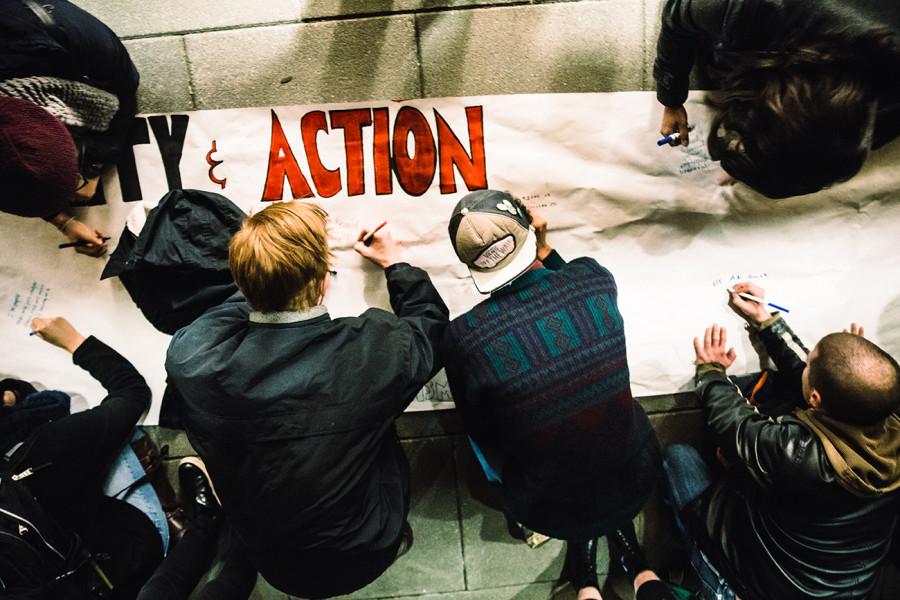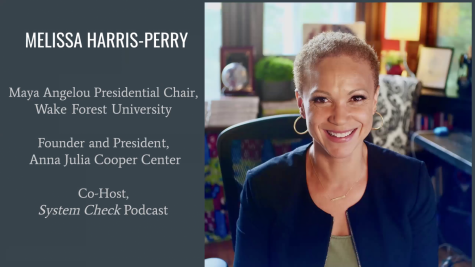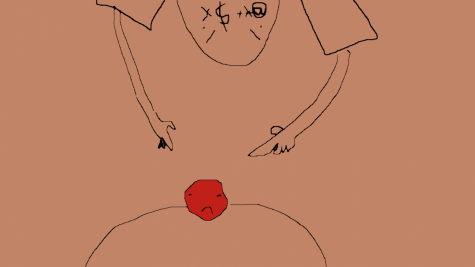Hundreds rally against racism on library steps
Photo by Tywen Kelly.
November 13, 2015
Over 250 Whitman community members gathered on the steps of Penrose Library Thursday night to stand in solidarity with student protesters against systemic racism at the University of Missouri and other colleges.
The rally at Penrose came after a day-long blackout protest in which students wore all black to draw attention to widespread racism at universities across the country. Students and community members gave speeches about their experiences of racism at Whitman.
“Whitman is not an exception. My voice matters, our voice matters, we belong here the same as everyone else. I am not here for an institution to count me as part of a diversity quota. I am not here for an institution that constantly pushes me backward, telling me my voice doesn’t matter. I’m not here for anyone to appropriate my experiences. I am not a token. I’m here, and I’m angry,” said junior Anna Zheng to applause from the crowd.

The day of action was organized by seniors May-Lannie Lozano, Allison Kelly and Marlee Raible. Late Wednesday night, the three were in the library working on a sociology project for class when the conversation turned to rallies against racism at other colleges across the nation.
“I remember seeing all the activism other schools were doing, and being frustrated that Whitman wasn’t doing anything,” said Kelly. “We realized if we didn’t do anything, we weren’t sure anyone would.”
After the rally finished, dozens of students wrote messages on a banner. The leaders of the protest tried to hang it in the library, only to be told by library staff that the college did not allow any posters to be hung without authorization from an administrator who would not be available until the following morning.
“You get all this lip service, and then when it times comes to doing something, [they say] ‘no, you can’t even hang up your poster,’” said Raible. “In my mind it’s important to hang up the poster because it’s a visual representation of the people who were there, and it’s also important that it’s in the library because that’s where [the rally] happened.”

During and after the rally, many students proposed ways systemic racism could be combatted through concrete goals. Several students suggested challenging the college’s portrayal of itself as a diverse institution in promotional materials and to prospective students.
“Whitman was sold to me as a diverse place, and I’ve realized that’s not true. I want to see people more angry. There’s a lot of talk about political correctness, but there’s no anger or real activism. So I’d like to see white allies…really get incensed about issues that are happening now,” said first-year Abby Takahashi.
Changing the college’s mascot of The Missionaries was another popular suggestion during the event. The mascot is part of the college’s promotion of a version of local history which glorifies 19th-century missionary Marcus Whitman as a white martyr while erasing the histories of the Cayuse, Umatilla, Walla Walla, Yakima and Nez Perce tribes.
Student activists were encouraged by the presence of many faculty at the rally as well. Associate Professor of Psychology Brooke Vick, a co-chair of the college’s Whitman Inclusion, Diversity and Equality Council (WIDE), expressed the importance of transforming the momentum of the rally into concrete change on campus.
”We need to move from expressing emotions only to figuring out some action plans that need to be done to start changing things for people. That’s the heart of what WIDE’s work is about,” said Vick. “Our goal right now is to put together a diversity strategic plan where we are thinking years ahead about what can we do, what change can we implement.”
The majority of students at the rally, like the majority at Whitman, were white. Senior Gladys Gitau, who has worked on issues of racism on campus for four years, expressed frustration with the difficulty of keeping movements going.
“How do we get whites to care?” said Gitau.
In a speech at the rally, Gitau pointed out the pattern of anti-racism movements fizzling as excitement fades. Two years ago, students rallied at Memorial Hall after a series of racist attacks against a student of color were made on social media and Whitman Encounters, a website for anonymous comments. In November of last year, junior Sami Carrillo was confronted by campus security and police in the doorway of his own home. With the aid of For Us By Us (FUBU), a group of students and faculty of color, Carrillo raised concerns of racial profiling with college administrators. The administrators refused to call what happened to him racial profiling.
“A lot of times what happens…is a lot of momentum builds up, but then it dies down until another event occurs. Talking with a lot of people, [it seems] this time around there’s a push to emphasize further action,” said Lozano.











